#ipytm*
Text
A Must Read
So glad @waitmyturtles brought my attention to this Teen Vogue article about purity culture. This is the start to a very good conversation about queer sex on screen, and as your resident “writing academic papers about sex in Only Friends” enthusiast I say everyone who watches queer media and BLs specifically should read this.
#red white and royal blue#rwrb#heartstopper#alice oseman#only friends the series#only friends#ofts#i told sunset about you#i promised you the moon#itsay#ipytm#gameboys#thai bl#pinoy bl#western bl#teen vogue#k-ci williams#if you’re lurking on tumblr I’ve got some friends who wanna chat Lolol
2K notes
·
View notes
Text
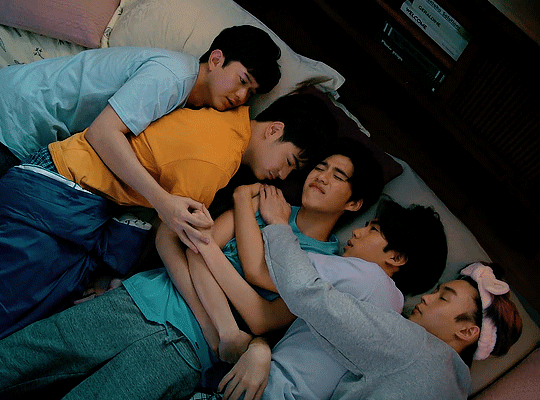

I PROMISED YOU THE MOON, episode 4 | A BOSS AND A BABE, episode 9
375 notes
·
View notes
Text
Can we as a fandom take the time to appreciate this woman?

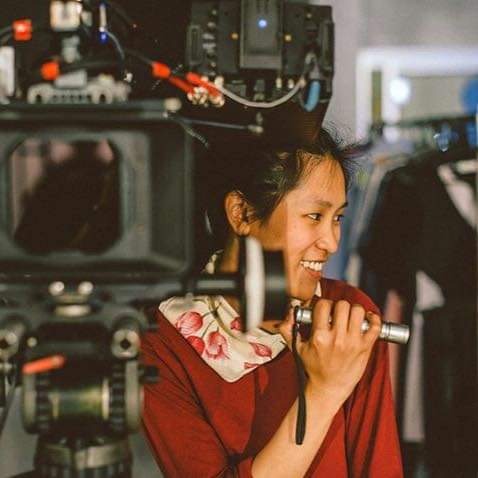
This is MANEERAT SRINAKARIN, a cinematographer. She takes care of every camera angle, lighting decision, and color palette that we as a fandom collectively drool over. She also worked on Project S: SPIKE and fucking I Told Sunset About You! She may not appear on the screen, but she’s what really makes this show perfect.

PROJECT S: SPIKE (2017) dir. Seua Pichaya

I TOLD SUNSET ABOUT YOU (2020) dir. Boss Naruebet
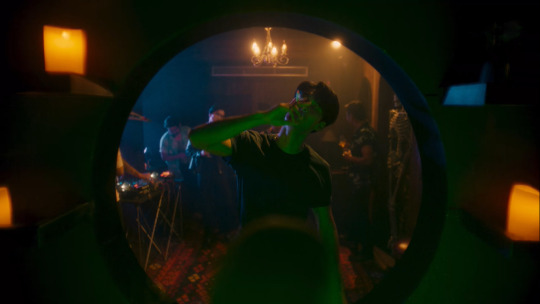
KINNPORSCHE: THE SERIES (2022) dir. Pond Krisda, Khom Kongkiat, Pepsi Banchorn
#i wrote a review for class and she got her own paragraph#i’ll marry her one day#my love#kinnporsche#kinnporsche the series#kinnporche#kinnporche the series#itsay#i told sunset about you#ipytm#i promised you the moon#last twilight in phuket#project s#project s: spike#cinemetography
2K notes
·
View notes
Text

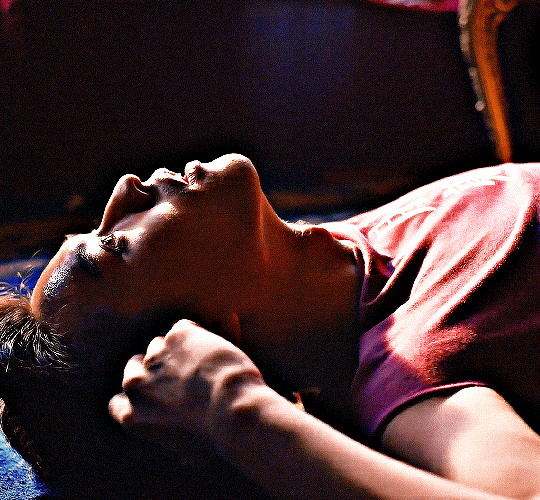
#what if I just went insane what then
#FUCK#i told sunset about you#itsay#ipytm#i hate giffing things and noticing new things free me from this prison let me GO#to be clear: this is about them both in the same episode fantasizing about having the others hand around their neck SICK#oh aew my beloved#oh-aew#oh aew#pp krit#cgedits#mygifs#phuket#thai drama#thai bl#hd gifs#dailytvfilmgifs#tvfilmsource#tvfilmedit#tvfilmgifs#televisiongifs#asiandramasource
77 notes
·
View notes
Text
I will admit to not having the brain power at the moment to analyze this article in depth. But it covers a lot of topics that I am really obsessed with — namely, in part, the relationship that queer media, globally, has with sex. I truly appreciate this Western author acknowledging the successes and obstacles that queer Asian art has enjoyed and dealt with, respectively, in the course of the developing BL genre. Some of our Thai BL favorites are mentioned in here, including Only Friends, ITSAY, and IPYTM. Definitely worth a read, especially if you’re watching the Western queer pieces of the moment and want to compare them to the amazing queer Asian dramas that we love.
#teen vogue#red white and royal blue#heartstopper#i told sunset about you#i promised you the moon#itsay#ipytm#only friends the series#k-ci williams#wonderful writing
123 notes
·
View notes
Text
Day Fourteen: Top five sad boys
Akk, The Eclipse
He's our ultimate sad boy, isn't he? Those fucking eyes. He's closeted and confused, he wants what he thinks he can't have, he wants to do what's right but has been conditioned to protect his abusive superiors. He's literally the moon to Ayan's sun, and he shines to much brighter when Ayan is with him.

Phob, Something in my Room
The cheeriest sad boy around. This series actually tore me apart, to the point I called my brother after the finale, bawling my heart out because, "they didn't get to grow old together," "but now they have eternity together!" Phob tries to be cheery and smiley for Phat, but deep down he's just sad. I mean, he literally took his own life because he was just so depressed with how bad his life had gotten. Then, he allowed himself to fall in love even though he knew he was on limited time. I absolutely LOVE this precious boy, and I will fight anyone who says anything bad about my sad little ghost baby.
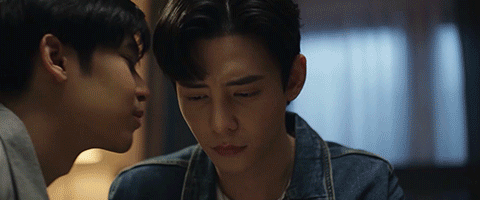
Tharn, The Sign
No one is gonna argue with this, right? This poor little tiny itty bitty baby is not only the reincarnation of a murdered Naga princess, but his parents were murdered, he was forced to live in a Buddhist temple for his adolescence because karma was against him, a Naga Prince General stalked him from his childhood and killed anyone to get close to him, then when he meets his eternal soul mate he has to constantly watch the universe try and kill the guy. He eventually ends up being a prisoner for a year (yeah yeah, I know he was 'caring' for Chalothon, but lets not pretend things didn't go in Chalothon's favour for a while), knowing that the man he loved was out there, no doubt a broken human.
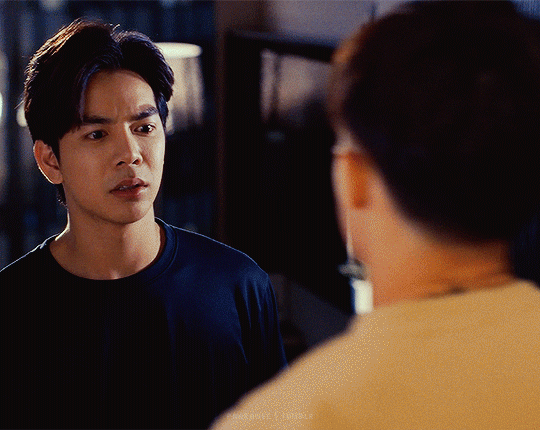
Oh-Aew, I Told Sunset About You/I Promised You The Moon
Oh, this precious little twink is my son. His best friend falls out with him because Oh-Aew realises he enjoys the same thing, then he gets his feelings messed around when they finally reunite, and then when things are going well he gets cheated on, and only gets a happy ending after going through emotional hell. However, he's so loving; he loves his friends, and always wants to make his parents happy. He's so precious, and deserves the world.

Gaipa, Moonlight Chicken
We didn't get nearly enough Gaipa in the series, but he's a precious sad boy with a longing, eternally unrequited love for an older man (*cough* there is like5 years between the actors *cough*) and he does everything he can to show his love. He gets knocked back, then his mother dies and it's all just heart wrenching.
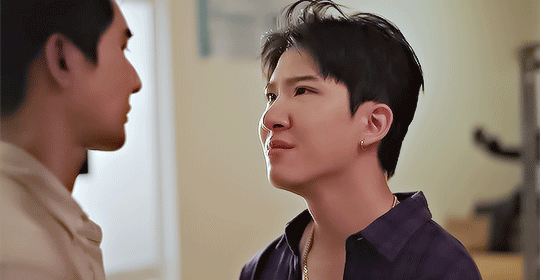
#blchallenge2k24#moonlight chicken#something in my room#the eclipse#i told sunset about you#itsay#i promised you the moon#ipytm#the sign#thai drama#bl drama#drama
26 notes
·
View notes
Text



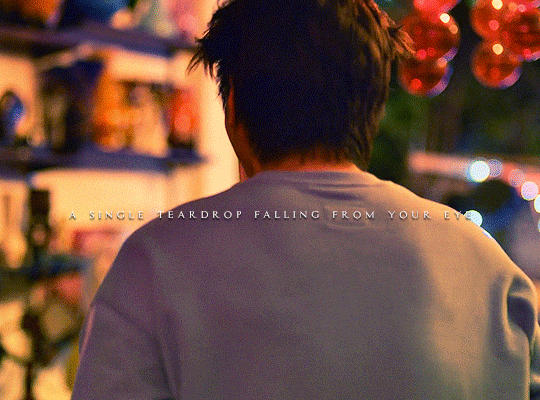
— save your tears
#i promised you the moon#ipytm#billkin putthipong#pp krit#this was a bit of a stretch#a big stretch actually#i claim to hate ipytm and then spend hours making a set 🥰#111gif#typ#if anyone has any angst quotes/lyrics + pairings send them my way#but i can only do them if i have raws cause my wifi has been out for 2 weeks and i don't think its coming back
114 notes
·
View notes
Photo
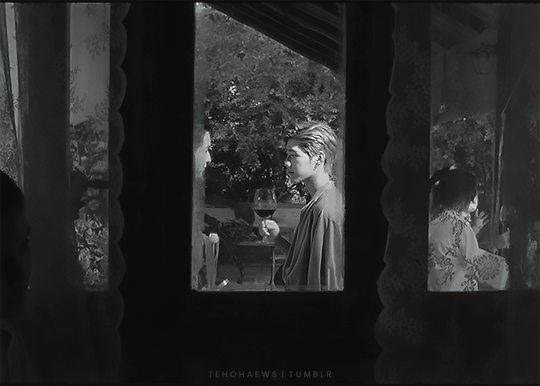
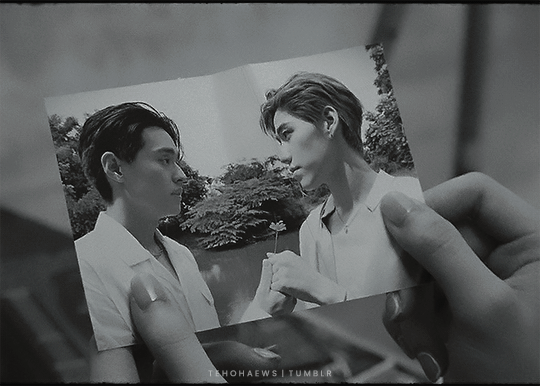
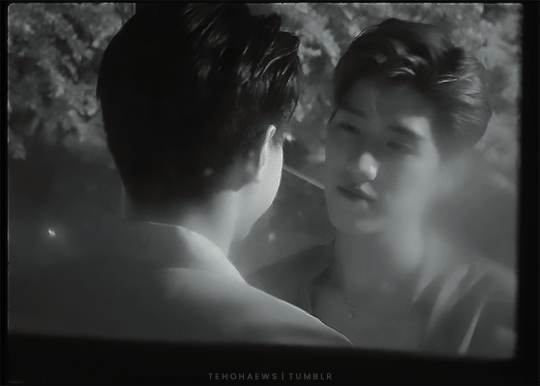
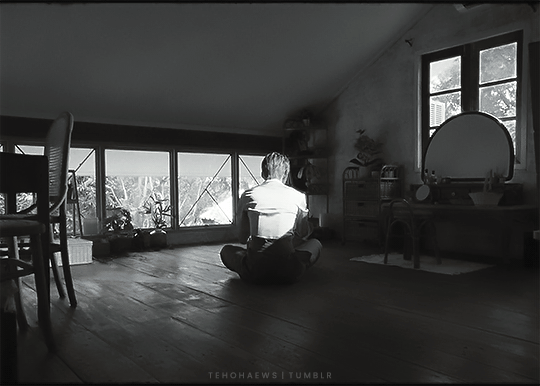
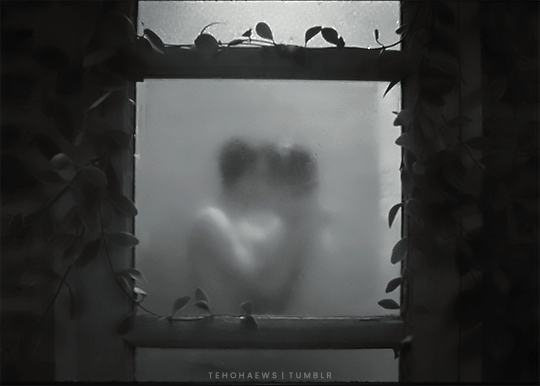

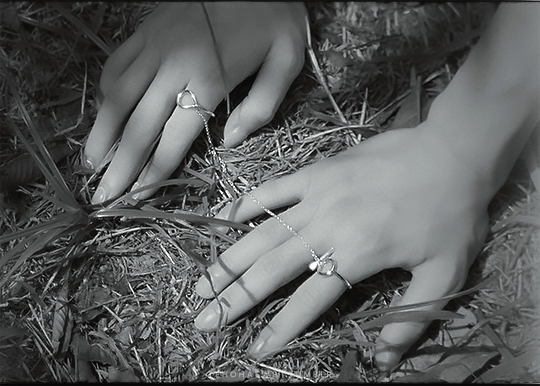

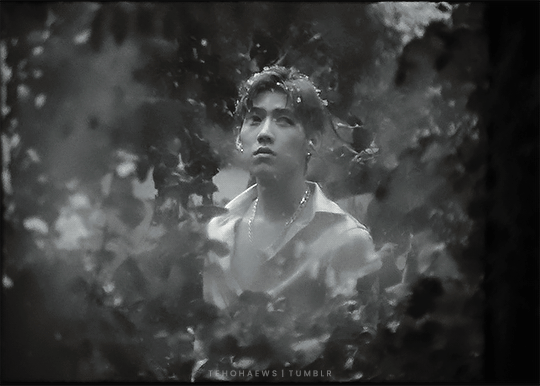

Billkin & PP in เท่าไหร่ก็ไม่พอ - Bell Supol
#bkpp#billkin putthipong#pp krit#bkpp the series#asianlgbtqdramas#ipytm#itsay#i told sunset about you#i promised you the moon#billkinpp#babe wake up new bkpp content by pboss just dropped#IM SCREAMING CRYING SHAKING#DFHUFDIDFHDFIDI#bkpp x pboss supremacy#but also 🤪#what in the ipytm remake is this#i thought we left the cheating plot behind with nadao#bkpp when they got the script: ah shit here we go again#gifs#userbillkin#usermor
416 notes
·
View notes
Text
ITSAY/IPYTM thoughts
In three parts because that's how I wrote it.

Oh-aew in a shirt which seems like the most meta English t-shirt text ever in Thai BL(ish) world (and there have been many others) but also seems like something Oh-aew would somehow own.
Part 1
I wasn’t assuming I’d have a ton to say about I Told Sunset About You. I wasn’t even planning on starting it at the particular moment I did, I just had it in mind I’d do so soonish. But wow, this drama hit me like a ton of bricks.
I tend to enjoy it when there’s a small gesture or moment onscreen that brings me back to uncertain romantic moments of young adulthood. Oddly enough, it’s often how someone leans (not kabedon-ish looming fwiw)—make of that what you will. (There’s this one moment in Between Us that hit me with something I can only describe as the world’s hardest pang.) But yikes, having so many... I guess first love feelings come up so hard and fast is really unusual and compelling, but almost too powerful for a sensitive creature such as myself. It’s certainly beautiful in an important way I think art is meant to be beautiful. But it’s less uncomplicatedly enjoyable than some things.
I don’t always have to identify with one character over another, even if one character is positioned as the protagonist of a story. I don’t always identify with anybody, though certain stories will pull me in in that way. But man, ITSAY gives me vertigo. Teh’s paradoxical mixture of obvious feeling and self-conscious reserve might normally make it so I’d be seeing things firmly from his perspective, but instead I whip back and forth between Teh and Oh in a borderline-painful way. I guess I just want so badly for them not to hurt each other.
Billkin’s left eyebrow jiggles like even Teh’s face is fidgeting nervously. At the point I’m currently at in the series, it feels like this kid is going to explode leaving only a fine mist. PP Krit is so still as Oh that it’s at least momentarily tempting to perceive him as solid, confident. But his steadiness is one of watching and waiting SO intently.
I feel like I could write an essay about the blinking alone, much less the overall category of looking. I don’t especially want to write it, but it’s there.
About midway through episode 2 I found myself kind of relieved to confirm there are only five episodes. I wanted to hurry through those most acute push & pull moments. But here I am at the beginning of episode 4 and it feels like it’s been a dang eternity.
Part 2
Back again after ending ITSAY and getting 4 1/2 episodes into IPYTM. I’m not writing about this show because I decided to do so, but because I don’t seem to have a choice. Not that I wouldn’t choose to do so, it’s just moot.
I think I’ve finally put into possibly inadequate words a thing Billkin does a lot as Teh. Sometimes his face just kind of goes... offline. He’s telegraphing despair while his face settles into a stiff mask. I find it a lot more true to life than what many actors do in similar scenes, but also very relatable in a way that’s painful! Again, in an art way. In a way that puts into practice the fact that we don’t only watch and read stories to pass time but because they help us understand ourselves. But part of me is annoyed, like a kid who’s been told to get in the car only to find they’re being taken someplace totally unforeseen and unappealing.
I find myself not wanting to explain what PP Krit is doing as much, but not because what he’s doing is less carefully crafted, certainly not because it’s less affecting. I said earlier that I was bouncing back and forth between identifying with each of them but not long after that first note of mine I stopped being able to identify with Teh very much. It might be a stretch to relate the events of this show too much to an experience of my own, but I was probably the Oh-aew in my first serious relationship, which was a very long one that was completely tied up with my entire college experience and a long first stage of adulthood.
I don’t judge Teh too harshly, but he just seems SO young. Like, younger than I may ever have been. Part of what makes this show good at what it does is that I don’t quite know what’s going on with him a lot of the time. There’s certainly a part of me that wants someone to explain what goes on in his head, but the ambiguity works for this show’s narrative style.
Maybe this will become more apparent, but am I supposed to have a strong conviction as to what Jai’s deal has been? Because that guy seems determined to give some of the most intense mixed signals I’ve ever witnessed. I feel like the director was going okay in this shot you’re in love with Teh. Okay now in this scene you feel like Teh’s kinda gross.
Honestly Teh is super gross! Billkin is a cute kid and Teh has many endearing qualities but he is a MESS. About half the time (well, half the time we see him onscreen, who knows what he does during time-jumps) the kid is barfing feelings like No-face from Spirited Away after he’s eaten nearly everybody who works at the spirit bathhouse.
I strongly suspect these characters and performances would bring up different things for people other than myself. This show is taking my personal buttons and stomping on them; presumably for others it stomps on slightly different or even opposite buttons, and for others it might trigger very little whatsoever of their own personal baggage.
Well, back to it I suppose.
Part 3
I feel less urgency now that I’ve reached the end point of the two series. Which is good for me but it means I have less to say at this point.
I’m very curious as to how a rewatch of these two series would feel to me. At first I thought a rewatch might be great—often that way I can relax and appreciate things more, since I’m not distracted by suspense as much. But I could just as easily wind up dreading certain moments. So many public scenes, yall. So much shame being experienced!
I would like to take a short moment to appreciate Hoon. His mom-pleasing powers may have complicated things for Teh, but it was such a relief to me that he was a sweetheart and a good brother.
I’m glad there’s a happy ending but I’m relieved Oh-aew got several chances to be resentful. (Not that I would have been unhappy with some less-than-happy endings. Too happy an ending would have been odd tonally anyway for this show.) I’m pretty sure I laughed out loud when Oh-aew was like but this time if you have a problem can you tell me and we can talk about it?
I was so glad Tarn got a little cameo at the end. It felt like giving her her due. Recognizing how that moment made me feel makes me realize how much I appreciate Tarn having interiority and agency as a character.
In other news, maybe I’m now one step closer to being able to see Na Naphat onscreen without immediately thinking of him as Tawan from Kinnporsche. And usually saying “f*cking Tawan!” in my head. It hasn’t happened yet, but I hope to get there. I’m sorry Na Naphat, I guess that performance was almost too good.
22 notes
·
View notes
Text
Round 1: Oh-Aew (I Promised You The Moon) vs Gaipa (Moonlight Chicken)
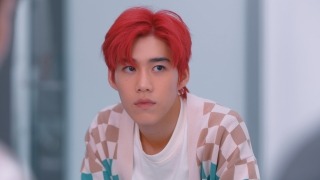

[Submitted Reasons Under Cut]
Oh-Aew: "Oh-aew is best known in 'I told sunset about you', but his gender-envy causing self really blossomed in 'Last Twilight in Phuket' and 'I promised you the moon'. The iconic red hair, the heart cut-out sweater in ep4, the oversized button-up in ep3, the blazer and the suit in ep5... He has so many iconic looks and he pulls them off all in his own androgynous way. Besides the way he dresses, he also is unapologetic and confident in who he is, which at the end of the day is what truly inspires gender envy. And he's an artist too!!"
Gaipa: "I love being a woman, but there is nothing so delicious as the notion of being a sexy man in a white tank top and gold chain. Gaipa looks so masculine and natural here. To me this look has an aura of freedom, confidence and sexiness that I just feel like I’ve never felt as a fem."
#bl bracket#bl drama#bl shows#round 1#oh aew#i promised you the moon#ipytm#gaipa#moonlight chicken#gender envy
30 notes
·
View notes
Note
Late top 5 ask because I just thought of it: 5 shows that you are always down to rewatch
What a great question that is also such a mean and incredibly evil thing to ask me, wen-kexing-apologist, Chronic Rewatcher lmfao
So fun fact I have seen KinnPorsche 14 times, Our Flag Means Death 11 times, The Old Guard 11 times, Heartstopper 11 times, The Eclipse probably 6 times, Bad Buddy and ITSAY 4 times, etc, etc, etc. And those are counting all the times I have watched a show all the way through. This is not counting the number of times I have actively gone back to watch specific episodes or specific scenes.
See the problem is sometimes I hyperfixate and then I just have to watch it until it is out of my system, sometimes an OST pops in to my head and then I get the urge to watch the show again, and sometimes I agree to edit the transcripts for the backlog of @the-conversation-pod and @bengiyo and @shortpplfedup start talking about a show and I'm like "ahhh good times! I should rewatch that!"
So you can imagine the stress I am under. I'll have to do this by category
Show I Am Constantly Rewatching: Bed Friend

gif by @perths
I know what you may be thinking, and yes you are correct I am in this rewatch for Uea's emotional journey. Uea is my sweet summer child, I love him, I have adopted him in to my family, his happiness is my happiness and I love love love watching him go from a quiet, reserved, unhappy character who keeps getting put in unfair situations through no fault of his own in to this confident, vibrant, happy person who is on his way towards healing. Often times it can be hard for me to pick A Favorite thing; a favorite character, a favorite scene because there are so. many. good. ones. But I am constantly, and I mean constantly rewatching the scene in Episode 8 where Uea tells King about his past. I have lost count of how many times I've seen it, no even kidding I watched that scene before I went to bed just last week. I will always always be down to watch that show because I love seeing how far my boy is able to grow with just a little bit of love, care, and therapy.
Show I Would Rewatch for an Instant Mood Boost: If It's With You
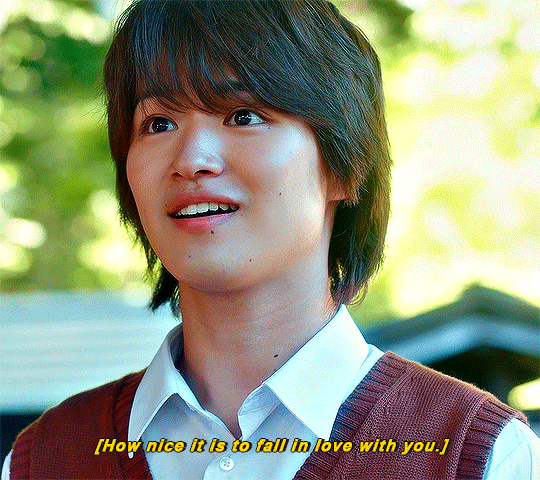
gif by @jimmysea
I have a difficult time understanding/feeling emotion in my body unless I abstract it in to fiction. So when I experience strong emotions it is typically when something super happy or super tragic happens on screen, in a book, during my D&D game, etc. One of my absolute favorite things is when something makes me so happy that my body is no longer able to contain it and I have to do the Neurodivergent Hand Flappies(TM). I think I spent 80% of this show grinning so hard it hurt my face and doing the Neurodivergent Hand Flappies because it just...they made me so happy. Amane is so sweet, and he deserves happiness, and he is getting his happiness and he's just full of sunshine and I already rewatched this show like immediately after it finished. This show joins my This Could Fix Me list.
Show I Would Be Down to Rewatch for Emotional Catharsis: Eternal Yesterday
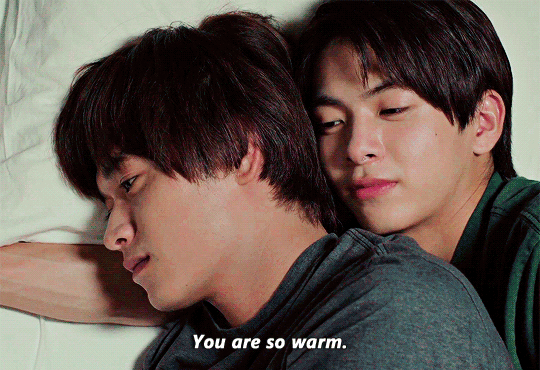
gif by @duckflyfly
I have not rewatched this show...yet. But I want to, and I know that I will eventually. I can only imagine that it is sadder and more evil the second time around. I cried soooo hard over this show. But it is beautiful, and it is healing, and the pain is a good type of aching pain that comes with coming to terms with grief. With acknowledging grief. With finding where the beauty and peace lie within death and memory, and the way its claws dig in to you and leave you changed forever. Ghosts can be warm, and this show makes me warm despite it all.
Show I Would Be Down to Rewatch for Content: I Told Sunset About You/I Promised You the Moon
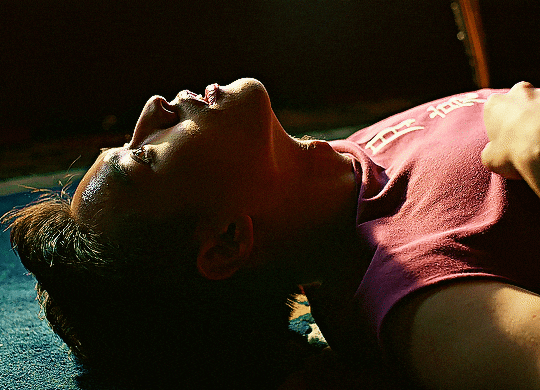
gif by @thii-nii
I think I am in @shortpplfedup's camp about how you find new things to think about every time you watch this show. I actually desperately, desperately own I Promised You the Moon several rewatches because I have seen ITSAY four times at this point and IPYTM once. I am currently rewatching IPYTM with a friend who is seeing it for the first time, so that should help. But the first time I watched this show I was unable to function to notice anything, and it wasn't until the third time I'd watched ITSAY when I was rewatching it to prepare for the podcast panel, that I finally was able to form any level of coherent analytical thought to it. So I would rewatch this at any point just to see what more I could pull out of it.
Show I Would Be Down to Rewatch But Haven't Yet: 180 Degree Longitude Passes Through Us
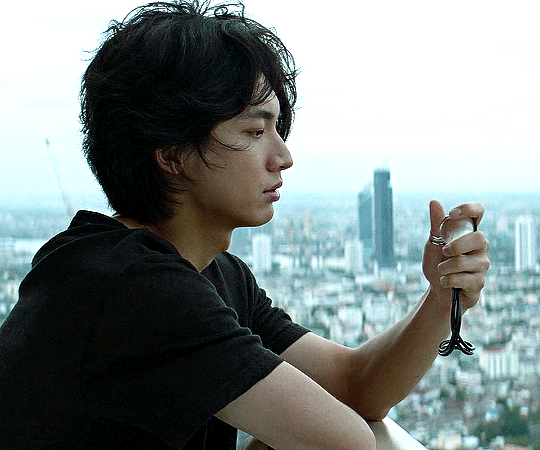
gif by @dingyuxi
Bold, based on how intense of a reaction I had to this show, I know. But this was one of my favorites, I never wrote anything about it because I was too busy having a literal mental breakdown over it, one that was so bad I almost had to bail on the entire show with like...20 minutes left of it, and I originally nixed my plan to show it to a friend. BUT I have watched the specific scene that did me in (and only that scene) and it went over fine once I knew to expect it so I do want to watch the whole thing again. I have a friend who I have been forcing to watch BL shows I liked and I watch them with her, and this is on the list. However, I am currently running her through I Promised You The Moon and What Did You Eat Yesterday? Season 2 so this show is still quite a ways out from a rewatch because I am not a total monster and want to give her some modicum of emotional break between those two shows and 180 Degree.
Bonus:
Show I Would Never Rewatch: Enchante

I hate this show truly an unreasonable amount. I hate Theo so much oh my fucking god. I refuse to watch this again and I'm mad that I finished it.
ASK ME MY TOP 5 OF ANYTHING BL
#best of bl#ask game#bed friend#bed friend the series#if it's with you#kimi to nara koi wo shite mite mo#eternal yesterday#eien no kinou#i told sunset about you#itsay#i promised you the moon#ipytm#180 degree longitude passes through us#180 degree#180d#the true answer to this is: my list of shows i'm always down to rewatch is long#my list of shows i will never rewatch is very very *very* short
44 notes
·
View notes
Text
Billkin is so fucking funny to me like
He’s an incredible actor. He’s awkward as hell. He has the sense of humor of an old man. He’s only ever acted in serious dramas. He’s best friends with the world’s sexiest twink. He has the personality of an embarrassing dad. He’s younger than PP. He acts like he’s PP’s legal guardian. He’s jaw-droppingly handsome. He’s one of the goofiest looking mfs I’ve ever seen. He has a gorgeous singing voice. He just shoved an entire rose in his mouth. He got flustered by PP’s outfits in the dihyli mv. He has performed an on-screen sex scene with PP. Twice.
He is inscrutable he is unknowable he is hilarious he is incredibly annoying and he is my bestie
#billkin#billkin putthipong#i told sunset about you#itsay#i promised you the moon#ipytm#moon post#im in awe of him#100
235 notes
·
View notes
Text
Me gearing up to rewatch the final two episodes of I Promised You The Moon: oh god do I really want to do this to myself?
Me finishing, with tears streaming down my face: YES EVERY AWFUL MINUTE WAS WORTH IT
14 notes
·
View notes
Text

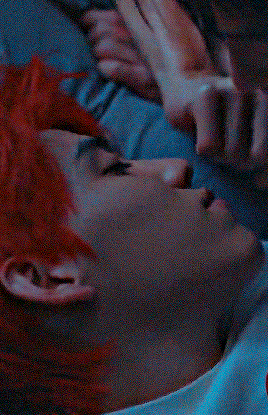

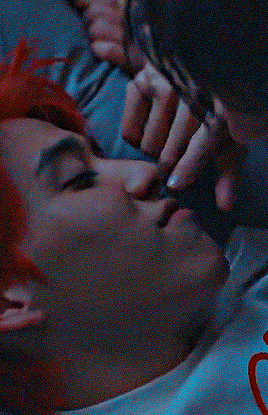
#I just think he's neat
#idk why i was thinking about this#shrug emoji#oh aew my love such a lil pretty#i promised you the moon#oh aew#ipytm#teh x oh aew#oh-aew#i told sunset about you#itsay#haunting my brain#pp krit#mygifs#cgedits#wish ipytm had more slow moments thats what made itsay so ughhhhh
44 notes
·
View notes
Text
Pain, Trust, and Separation in Some Asian Dramas (The Second Post In a Series of Utterly Un-scholastic, Highly Personal Big Meta)......
AKA, Turtles Catches Up With Old GMMTV: The Bad Buddy Rewatch Edition, Part 2 -- How Themes of Pain, Trust, and Separation Create Structure and Narrative in Bad Buddy and Other Asian BLs
[The following is a preamble I use for my Old GMMTV Challenge posts, here we go! What’s going on here? After joining Tumblr and discovering Thai BLs through KinnPorsche in 2022, I began watching GMMTV’s new offerings -- and realized that I had a lot of history to catch up on, to appreciate the more recent works that I was delving into. From tropes to BL frameworks, what we’re watching now hails from somewhere, and I’m learning about Thai BL's history through what I’m calling the Old GMMTV Challenge (OGMMTVC). Starting with recommendations from @absolutebl on their post regarding how GMMTV is correcting for its mistakes with its shows today, I’ve made an expansive list to get me through a condensed history of essential/classic/significant Thai BLs produced by GMMTV and many other BL studios. My watchlist, pasted below, lists what I’ve watched and what’s upcoming, along with the reviews I’ve written so far.Today, I offer the second of four posts on Bad Buddy, and the second in a Big Meta series on pain in some Asian dramas, including QLs and/or het romances. I'll look today at how ideas of pain in love, trust in love, and separation of partners/family members creates narrative drive in Bad Buddy and other Asian BLs. THIS IS A LONG POST, caveat emptor.]
Links to the BBS OGMMTVC Meta Series are here: part 1, part 2, part 3a, part 3b, and part 4
Well, after a lot of titles and a chewy preamble (thank you for getting through that, y'all!), I'm here to say that I'm combining my two ongoing meta series into one big ol' post here that I've been dying to write for months. In the course of my watching the shows on the Thailand-based Old GMMTV Challenge watchlist, as well as watching shows from my BL gateway of Japan, I've noticed that the themes of pain and trust in love, along with voluntary or involuntary separation, have been used to create dramatic and narrative structure within Asian dramatic stories to many emotional effects.
I'm celebrating the incredible Thai BL drama that is Bad Buddy in my OGMMTVC series at the moment, and within my Big Meta series on pain in Asian dramas, I examine how themes of pain so very often harken back to artistic, and even traditional, viewpoints of how pain, suffering, and melancholy are natural cultural assumptions within many collectivist Asian societies. In my first Big Meta on pain and suffering in Asian dramas, I wrote that "accepting pain and suffering is a part of the life we decide to live, from an Asian cultural perspective." Suffering is a naturally assumed part of life, a very distinct and identified part of a Buddhist's lived life, and even outside of Buddhism, accepting and living with difficulties of all kinds -- wealth disparities, the struggle for a good education and/or a successful career, the struggle to conform to collectivist familial and/or social expectations, etc. -- are extremely common themes that are unwound on in Asian lives on a minute-to-minute basis. The idea that an Asian must live with pain is often a root of intergenerational trauma, passed along from generation to generation of Asian children-to-adults. The social mores by which Asians are raised and live, to assume what Westerners might call a lack of unconditional parental love and affection, are certainly in part rooted in an assumption that living with pain and without the, say, luxury of turning over one's emotions at any given moment, are an automatic given.
As I've plodded through the OGMMTVC watchlist, I noticed very often that separation of people -- whether those people are lovers, children/parents, or simply just adults within a group -- is often a major narrative turning point in the course of a dramatized relationship. Of course it would be; it's a common trope within the romance genre, for instance.
But I find the separation of people otherwise connected to each other -- and the assumed pain of that separation, and the trust that people may have to return to each other -- particularly fascinating within the realm of Asian dramas, for reasons relating to the assumption of pain and suffering in one's life within Asian cultures that I mentioned above. In other words, the pain of separation, and the trust that one might have that one person will come back to another person -- are givens within the scope of Asian life.
In the following dramas, I note that separation is either a central storytelling point, or is a central focus of side characters:
1) The Thai filmmaker, Aof Noppharnach, has explored separation of people/lovers in many of his shows, including Still 2gether, A Tale of Thousand Stars (in multiple forms), and in Bad Buddy (also in multiple forms, romantic and/or familial).
2) Also from Thailand, Until We Meet Again and I Promised You The Moon are two non-GMMTV dramas in which separation of lovers plays an important concluding narrative role.
3) From Japan, the movie version of Cherry Magic: 30 Years of Virginity Can Make You a Wizard?! captures an important central narrative of separation that leads the franchise's two protagonists, Adachi and Kurosawa, to explore depth in honesty and intimacy that they may not have otherwise achieved in their everyday lives.
The painful separation that occurs in Aof Noppharnach's shows is most often related to the outside forces of life as it needs to be lived -- very often economically -- within or external to Thailand. In Bad Buddy, Pran leaves for Singapore for two years. I'm going to unwind much more on Pran leaving for Singapore in the final installment of my Bad Buddy OGMMTVC meta series, particularly by way of how he can do it, emotionally. But I want to offer a quick note about Pran's departure that the show gives a hint to (despite the pain that we feel in our hearts for Pat's loneliness from Pran, as depicted so beautifully by Ohm Pawat and his silent and longing existence as Pat in the first half of the Bad Buddy series finale). The BBS finale has Pran stating that he'll only be away for two years, and that the pay and the opportunity for an excellent architecture job were better in Singapore. In conversation with the fabulous Thai blogger, @recentadultburnout, RAB mentioned that this is a common occurrence among young Thais -- to move overseas for better job opportunities.
In spite of my heart breaking a bit for Pran being away from Pat when I first learned about his leaving for Singapore -- when RAB put Pran's departure in that context, I had to slap my cheek a bit. Because! I'm a child of Asian immigrants. Separation from family for better economic opportunities is a HUGE part of our paradigm of life between continents. As my Asia-based uncle, my mother's brother, once put it, in regards to my mother: "one of the children in our families always had to move away." For my mother's family, it was my mom who shipped off. Besides individuals seeking better economic opportunities for themselves, the economies of many Asian countries are dependent on the reception of remittances from overseas family members sending money back to their home countries, as my mom did for years; the Philippines is particularly notable for having a nearly 9% contribution from overseas remittances to its gross domestic product. In other words? The separation of loved ones is literally built into the financial frameworks of many Asian nations.
The separation of children or partners to overseas locales for the sake of better salaries and/or opportunities is simply a more assumed part of the cultural paradigm, I'd argue, in Asia than in the West. Family separations for jobs are extremely common in Asia; in the West, I'm not sure they are as assumed, especially for extensive separations, as the value placed on keeping a family unit together for cultural or spiritual reasons seems to be more a part of the Western fabric of life (despite our high rate of divorce).
We see an even more permanent economic separation happen in Still 2gether between two side characters -- Type, played by Toptap Jirakit, who is Tine's (Win Metawin) brother, and Man (Mike Chinnarat), who is Sarawat's (Bright Vachiwarit) friend. Man chased after Type during the first 2gether season; in Still 2gether, they're navigating their committed relationship, as Type contemplates, then accepts, a permanent job offer in Phuket, hours away from their home base in Bangkok.
As @lurkingshan put it, I might be the only person on the planet contemplating Type's and Man's relationship (lmao, it do be true), but I found Type's last conversation with Man, on the beach, to be particularly direct and moving for someone who has no immediate plans to move back to the side of the person he's dating.
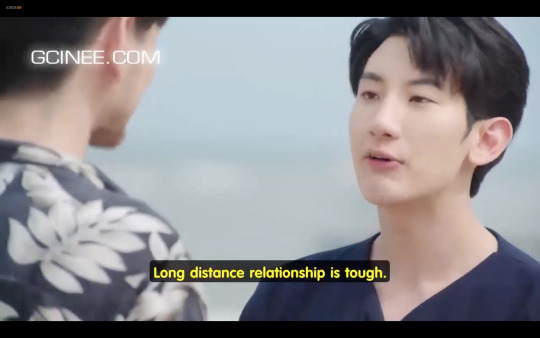
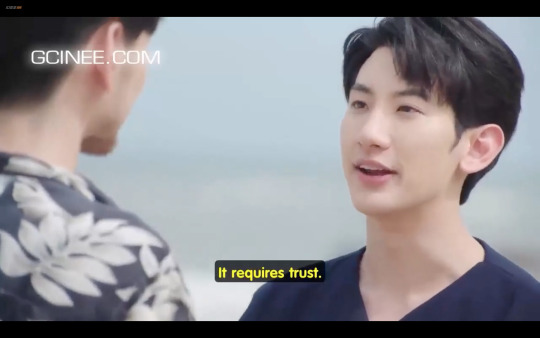
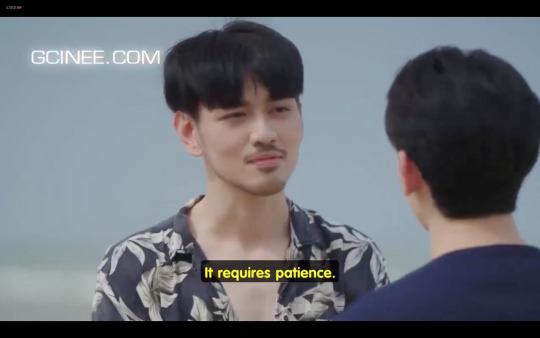
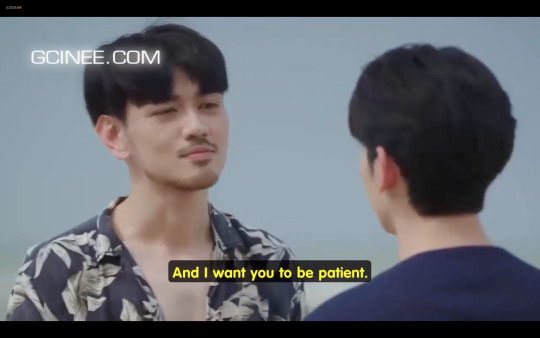

I think about this scene against the structure of the short series that is Still 2gether, which is centered around the protagonists of Sarawat and Tine being temporarily separated as they prepare to compete in a university-wide tournament. Sarawat has the most lovely contemplation on love during this separation, and even Aof Noppharnach himself admits that the glance that Sarawat and Tine give to each other as they pass each other in the lead-up to the ultimate tournament is his favorite scene he's ever filmed (!!!) (and that scene is sooooo reminiscent of Pran's and Pat's pinky-hold after their public "break-up").
In other words: Still 2gether is ALL about separation, and contemplating the strength of love relationships in the face of those separations. While Sarawat and Tine will get back together, after that tournament -- Type and Man are separated for the foreseeable future. There is no end indicated to the patience that Type wants from Man. The conversation is just, THERE, and hanging -- there's an acknowledgment that long-distance relationships are tough, but Type isn't offering to quit his job and move back to Bangkok. Instead, Type and Man are left to accept the reality that there is no end in sight to their separation.
And I think this was incredibly bold of Aof Noppharnach to include in a GMMTV BL that otherwise ended happily for Tine and Sarawat, the main protagonists. What I admire about Aof's works are these sly inclusions of open-ended, sometimes melancholy non-resolutions, either for his main or his support characters, that leave us as viewers often slightly unsatisfied or unfulfilled. He did this in particular with the character of Aof in Gay OK Bangkok, a web series that he screenwrote in 2016; and many might say that Pran being away in Singapore is also not the most satisfying of endings for our beloved PatPran in Bad Buddy. To me, these decisions to do this artistically are just incredibly reminiscent, again, of the kind of pain that we as Asians have been culturally attuned to accept, for the sake of economics, and/or for the sake of the betterment of our loved ones.
Besides economic separations in Aof Noppharnach's works, we also have separations related to family demands and desires. In A Tale of Thousand Stars and Our Skyy 2 x A Tale of Thousand Stars, we see Tian leaving Phupha's side for two years to study for a graduate degree at Tian's mom's insistence; and we see Phupha refusing to join Tian, after Tian has graduated and moved back to Pha Pun Dao, on trips Tian takes back to Bangkok to celebrate his birthday with his parents.
When I rewatched ATOTS earlier this year, I noted that both Phupha and Tian were remarkably bad communicators throughout the original series -- and I posited that, in large part, their terrible communication was borne out by way of the both of them being raised in traditionally masculine Asian households that seemed to not allow for leeway regarding emotional revelations. BOTH Phupha and Tian were expected and intended to follow in the footsteps and demands of their family members. To the end of the ATOTS storyline in Our Skyy 2, Phupha brings up his parents -- and he hears what he has been wanting to confirm from Tian's parents, in their desire to have Phupha take care of Tian for the rest of their lives.
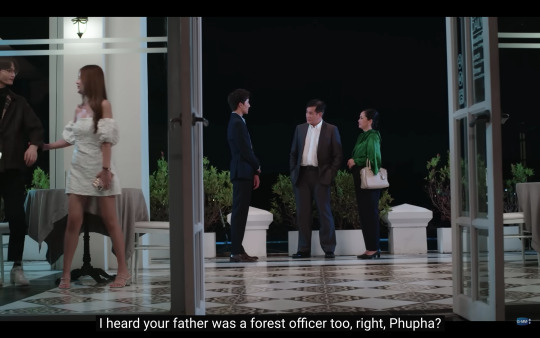

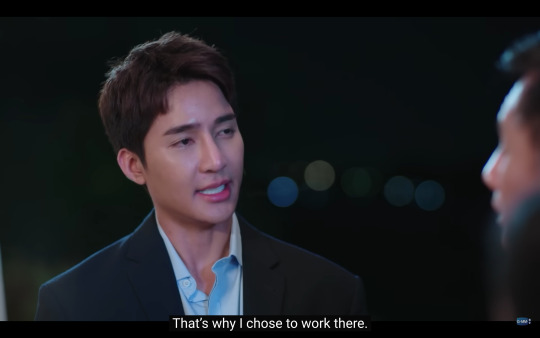
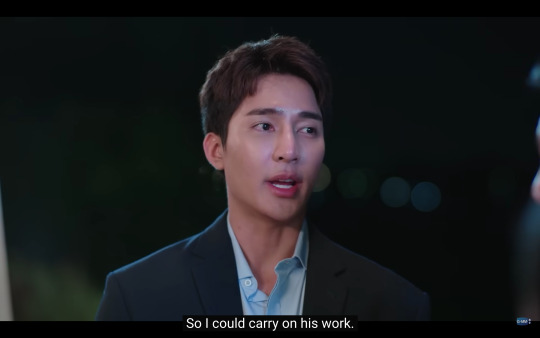
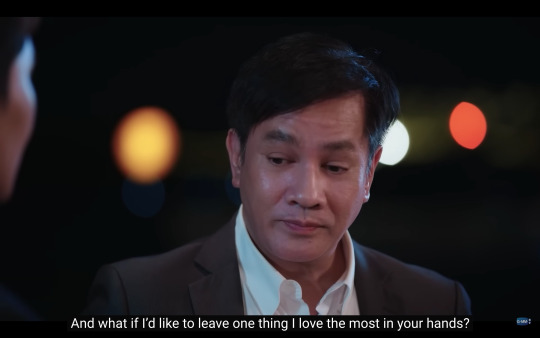
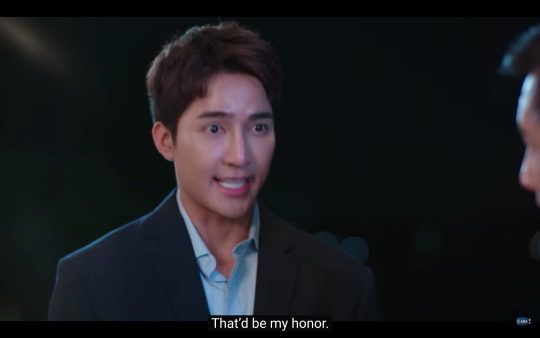
Phupha in particular needed to have multiple gateways opened to him, vis à vis Tian's family, in order to properly and openly confirm his permanent love and commitment to Tian. If Phupha didn't have that? He was willing to be separated from Tian, either temporarily, or at length. Phupha needed a kind of culturally accepting door opened to him -- as a man raised in what we assume to be a rural and traditional environment that may very well have not allowed for a gay man to live openly and honestly. Phupha indeed follows in his father's footsteps, to the extent of never leaving Pha Pun Dao, and demanded that he have Tian's family's approval before making the final commitment to Tian to love Tian forever.
I find the cultural nuances of nuclear family separation, or separation encouraged by nuclear family, to be particularly heartbreaking in many of Aof Noppharnach's works. We know that Jim and Jam, brother and sister in Moonlight Chicken, ran away from their Isan hometown as youths to find their lives in Pattaya, where we meet them in the context of that show. But separation either from nuclear family, or more impactfully, done by nuclear family, is most evident in Bad Buddy.
Besides Pran voluntarily leaving for Singapore, we know that Pran has been involuntarily separated from Pat before -- when Pran was transferred to a boarding school in 10th grade by his mother, Dissaya. Before that transfer, Pran and Pat were technically "separated" by their parents in so far as they were not supposed to become friends -- all while competing heavily against each other in every category of life.
That boarding school transfer? That wasn't just separating Pran from Pat. What I found remarkable about that separation during my recent BBS rewatches is that Dissaya HERSELF chose to be physically separated from her own son, for the sake of her rivalry with Pat's father, Ming.
I'm thinking about this particularly from the words she used with Pran as they sat at breakfast together before Pran started his second year at university, when Dissaya said that Pran could date anyone, men or women, as long as he "didn't date [the next door kid]."
My interpretation of that perspective is that Dissaya did not want Pran to relieve the heartbreak that she herself experienced when she was close with Ming in her teenage years.
In other words: she chose to send her son away in the face of her ongoing, lifelong fear that Ming and his family would once again wreak havoc on her and her clan.
In the continuation of the intergenerational trauma wrought upon Pat and Pran by their parents -- as a mother myself, this seems to be particularly egregious. Dissaya would have rather had her son AWAY FROM HER, than to contemplate her son even being WITHIN physical proximity to Pat in the context of her hatred of Pat's father, Ming, and the fear that she had that the Jindapats would negatively influence the Siridechawats again.
(The wonderful @telomeke reminded me, in conversation on this topic, that the first question Dissaya asks Pran, after learning about the first faculty fight in episode 1 when Pran re-encounters Pat for the very first time, was, "Did he hurt you, Pran?" Dissaya cannot bear to allow the Jindapats to hurt her son, or her family, ever again.)
I wrote in my first Big Meta on pain and suffering that Asian parenting expectations and mores are far more conditional than they are in the West, as parenting mores in the West are centered around unquestioned and unconditional love from parents to children. So much of Bad Buddy meta out there focuses on the internal experiences of Pran and Pat. When I sat back to think about Dissaya making the decision for herself to be separated from her son for years -- and then to also contemplate pulling Pran FROM COLLEGE when she learns that Pat goes to Pran's university -- I mean. We know Dissaya and Ming both tried their best to embody their hatred of each other into their children. But Dissaya takes it a couple steps further, by attempting to literally control Pran's physical existence vis à vis Pat, which -- and I'm going to sound like a judgmental Westerner here, even as an Asian -- strikes me as out of line by way of just pure emotional projection onto one's children.
When Pran goes to Singapore, at the end of the series, it's out of his own volition. Again, I'll write more about this at the end of my BBS OGMMTVC meta series. But what he experienced by ways of many TYPES of separation from Pat throughout his life -- competitively, emotionally, and then physically -- are extensive. He was physically separated from Pat by Dissaya. He was theoretically "separated" from Pat emotionally, by being discouraged in having a friendship with Pat. He is physically separated from Pat *again* when he goes to Singapore. And I posit later in this piece that Pat and Pran had another theoretical "separation" when they are pretending to be broken up throughout the course of their relationship.
When I think about what teenage Pran must have felt to be *physically sent away* -- BY and FROM his own family, for their sake of his family's desires to avoid ANOTHER family -- it explains a hell of a lot more about Pran's tendency to dissociate, particularly during stressful times. (We see this when he's alone at the demolished bus stop, and cutely in Our Skyy 2, as Pat encourages a grumpy Pran to go to Pha Pun Dao.)
And where Pat balanced Pran out -- where Pat could offer the kind of companionship, and relaxed and equitable communication that Pran had never had with his family -- was where Pran could finally experience truly open and SAFE love from and with another person, another person who wouldn't *send him away* if Pran didn't play by their rules. Instead, Pat fought by Pran's side, and Pran was willing to fight, too, and they remained together, and safe in their love and trust.
Whew. Dissaya separating Pran from his own family, from herself -- to leave him alone at boarding school -- seriously punches me in the gut, especially as a mother myself. I'm thinking about a teenager, on the cusp of adulthood, alone to contemplate his unending love for Pat, and I'm like.... I wouldn't leave a kid alone like that for a moment. But for Dissaya, her husband, and their pride? It seemed to be a worthwhile decision in that moment. A decision that we know would blow up in their faces in episode 10 of Bad Buddy.
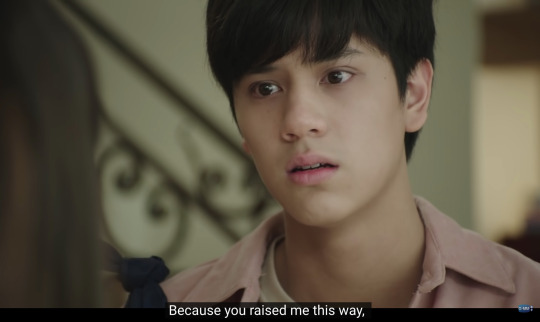
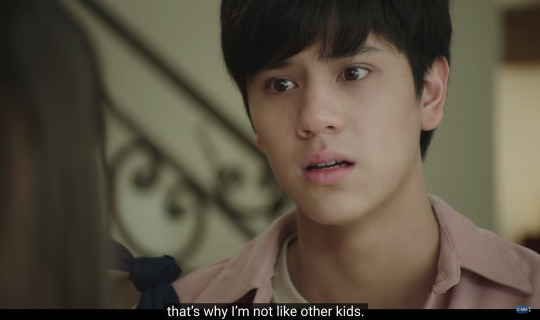
In Pran's first separation from Pat -- Pran did not have personal agency. He did have agency later on, as he moved to Singapore, which again, I'll contemplate in a further meta.
Two instances where I was impressed by protagonists leveraging their agency vis à vis temporary separations from their partners was in Until We Meet Again and in I Promised You The Moon.
UWMA's Pharm was first and foremost presented as a blushing maiden. HOWEVER: Pharm demonstrated quite a bit of sexual agency early in the series. He was forward in his crush on Dean. He contemplated openly being gay. And he wasn't afraid to push Dean away when Dean was moving too fast sexually.
At the end of the series, after Dean and Pharm have resolved their spiritual connection vis à vis the embodied spirits of Korn and Intouch meeting once more -- Pharm wants to know if the love between him and Dean is real, and independent of the influence of the spirits of Korn and Intouch. So: Pharm asks for a break.
Throughout UWMA, Dean is the obvious seme, and Pharm is the blushing uke. I squealed in DELIGHT when I first watched Pharm asking for the break. Yes, Pharm loved Dean -- and what I saw in Pharm's asking for a temporary separation was truly out of that love, to confirm between the both of them that their relationship was very much indeed a forever relationship. God, I get chills thinking about it: Pharm was safe enough in his sphere with Dean to ask for and to GET the agency-driven space that HE NEEDED to feel fully confident in the relationship. That was a risky move that paid off for the two guys in dividends in the end. Dean had no choice but to say yes there.
The fabulous Oh-aew in I Promised You The Moon goes even further than Pharm. He fucking breaks up with Teh! After Teh cheated on Oh-aew! YES, HOMEY, YES! No wibbling on Oh-aew's end. Oh-aew was devastated, yes. But he knew he had to have Teh out of his life in that moment, for the sake of Oh-aew's own happiness, growth, and development. He even rejects Teh's reach-out at the end of their college careers.
What stuck me as so golden about the ending of IPYTM was that that break-up wasn't actually presented as temporary. They were apart for OVER A YEAR (thank you kindly to @shortpplfedup for the temporal fact-check!). Oh-aew held his ground. He needed his time and space. He needed to grow! And he valued that, individually.
I'm celebrating these two instances of agency-driven separations because of the style of their intention vis à vis the protagonists asking for, needing, and leveraging these separations. With the economic and involuntary separations I talked about earlier -- it's like there was a higher need, whether it was for money, a better career opportunity, fear, or selfishness on the part of a family to create the separation.
With Pharm and Oh-aew: the separations they demanded were purely personal and for their own growth. We know now that Pharm and Oh-aew get their endings with their partners. Pharm has a purely happy ending with Dean in Between Us. Oh-aew's ending with Teh is open-ended -- we don't know what chaos Teh will wreak next -- but at least we know they're navigating that chaos together again.
The last drama I wanted to take a look at regarding pain, trust, and separation is the fabulous movie continuation of Cherry Magic: 30 Years of Virginity Will Make You a Wizard?! (I always love writing ?! whenever I talk about Cherry Magic, lol).
The central separation in the movie of the two protagonists, Adachi and Kurosawa, comes about when Adachi is transferred to Nagasaki for work. As @neuroticbookworm and @lurkingshan can attest to: a Western viewer of Japanese BLs will often find themselves screaming to a screen, "JUST TALK ALREADY!," and a uniquely common aspect of Japanese doramas is that so much of communication in Japanese culture is silent, unsaid, kept internal by collectivist social pressures to not make waves with another person -- which automatically creates ongoing questions of trust between partners. When Adachi (Akaso Eiji) shares with Kurosawa (Machida Keita) that Adachi will be moving, Kurosawa shares in words that he's happy for Adachi, but through very simple body language, communicates that he is feeling otherwise.
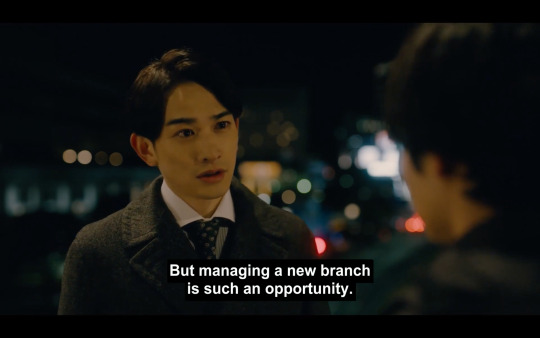
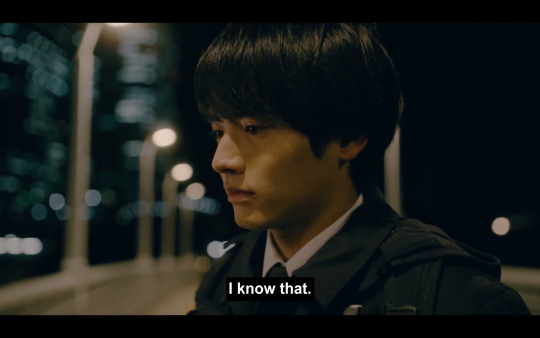
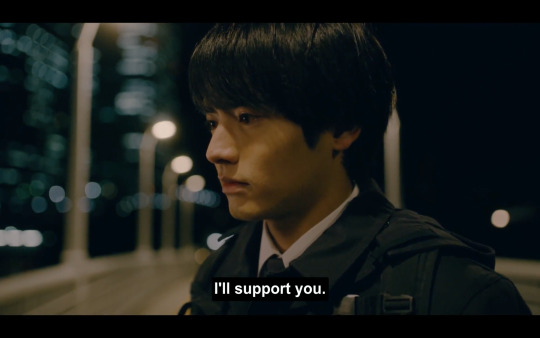
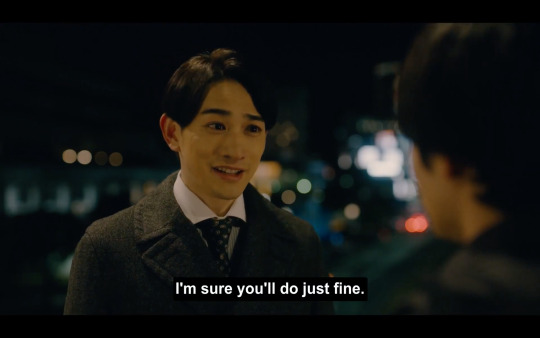
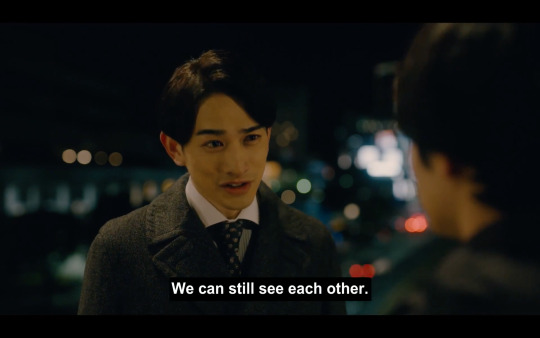
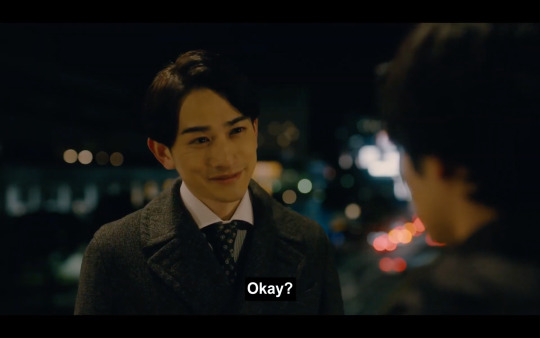
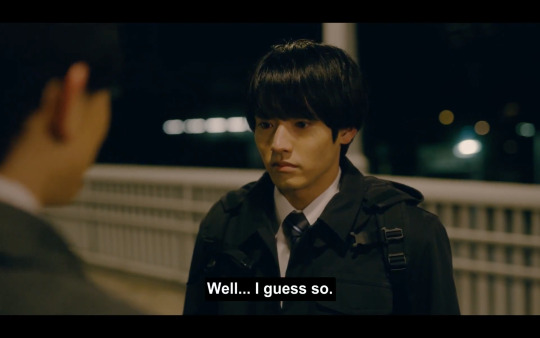
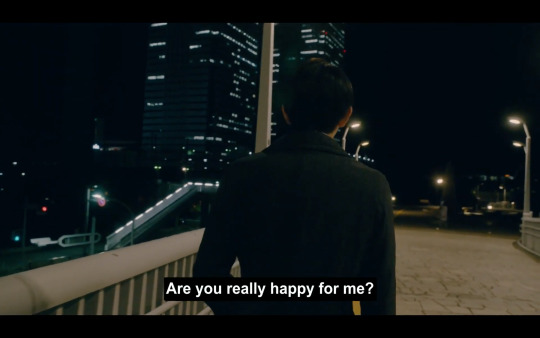
Later in the movie, Adachi gets into an accident in Nagasaki, and Kurosawa rushes to be by Adachi's side. Kurosawa is clearly traumatized. And Kurosawa finally reveals his feelings about the entire situation -- a rare display of direct emotional confession.


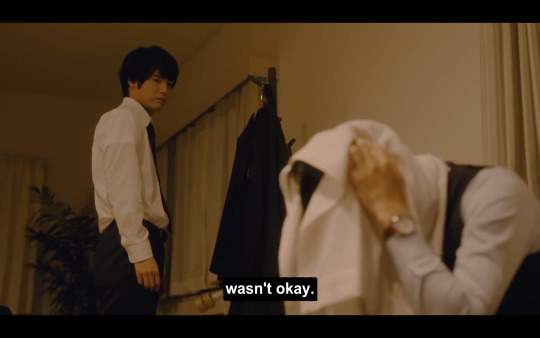
We think that Adachi moved to Nagasaki for this job opportunity -- separating himself from the incredibly devoted and head-over-heels-in-love-with-Adachi Kurosawa. Adachi knows well enough that Kurosawa is suffering in this separation. But later in the movie, after Adachi has moved back with Kurosawa, do we learn Adachi's true intentions. Adachi wants to make himself invaluable at work -- so that Adachi's and Kurosawa's shared company will not separate them if the company finds out about their relationship.
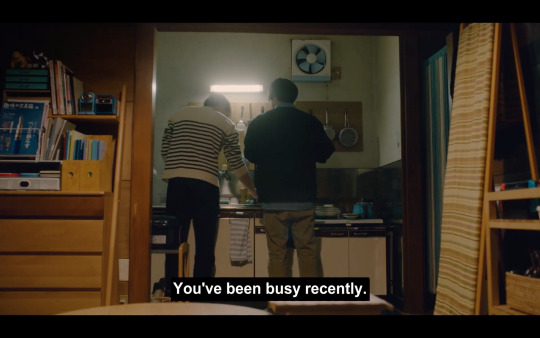

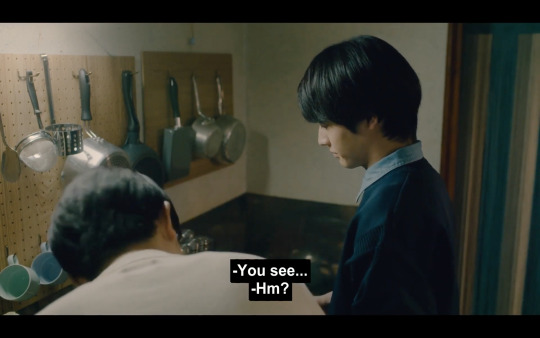
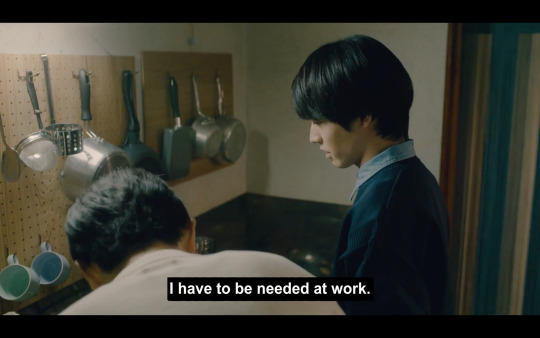

This particular conversation between Adachi and Kurosawa -- after their separation, after they've moved in together -- is a huge turning point in the movie for Adachi, who had usually been the reluctant uke in their relationship prior to this moment. In this conversation, Adachi expresses his fear that outside forces will eventually separate them, and he wants to do what he can to ensure the safety of their relationship.
To me, this is incredibly reminiscent of the compromises Pran and Pat make in Bad Buddy to keep their relationship secret -- another theoretical "separation" -- from their parents for the health, safety, and viability of their relationship.
As well, this conversation between Adachi and Kurosawa moves forward into Adachi's desire to come out to their families. He was inspired by the immediate aftermath of the accident, in which Kurosawa was the last person to find out that Adachi had gotten hurt -- only after Adachi's family and company were notified.
The nuances of this separation between Adachi and Kurosawa -- and what the separation LED TO, which was an eventual and permanent commitment between Adachi and Kurosawa -- are incredibly layered. Adachi made an economic separation from Kurosawa. But it was also rooted in his desire to acclimate his company to his company's dependence on Adachi, so that the company would choose Adachi's contribution to the company over the potentially taboo reality of his same-sex relationship with a colleague in Kurosawa. In other words: he wanted to leverage the separation and his work performance upon his return, to render the company no choice in choosing Adachi's economic performance over his personal and private choices.
(One insight into Japanese culture is that for decades, Japanese corporations have wanted their employees to be married, to complete a seamless connection between household and "office" families. The Japanese BL Kinou Nani Tabeta?/What Did You Eat Yesterday? makes reference to the fact that the main protagonist, Shiro, becomes an independent lawyer because, as a gay man, he may have been pressured to take a wife in another, more group-oriented corporate setting.)
AND, following this, Adachi wanted to come out to his and Kurosawa's families, to also acclimate them to their relationship, so that their families would also not threaten the sanctity and safety of their relationship. And his gamble worked -- and their families accepted them, and they were able to make a permanent commitment to each other.
Without a strategically economic separation, Adachi and Kurosawa could not have achieved key moments of communication that led to their ability to find safety in their external environments, and make a personal and private permanent commitment to each other. The separation to Nagasaki was Adachi's lever to move their relationship forward.
It's so nuanced, so layered, and so strategic on Adachi's end, to use the work separation and his commitment to his company as such a motivator to propel his relationship forward and permanently with Kurosawa -- especially vis à vis the unique nuances of spoken and unspoken communication in Japanese society, which are remarkably different than the styles of communication we see in Thai dramas.
In Pran's and Pat's conclusion in the Thailand of Bad Buddy, they go in the opposite direction: for the sanctity and safety of their relationship, they act out a break-up scenario (with Dissaya telling Pran, "come back to your family," ha), and keep their committed relationship a secret. And this happens *two years* before the context of an actual, physical separation when Pran decides to move to Singapore after graduation.
It's a bit of a switcheroo from what we'd expect by way of open vs. closed communication between Japan and Thailand. But both scenarios, from Cherry Magic to Bad Buddy, work brilliantly well to ensure that all relationships are safe and solidified.
I'm not sure that I can say, globally, that separation from one's nuclear family, or separation from a partner, are common occurrences in manifested everyday reality. As I mentioned before, the economies of many countries are dependent on the physical separation of their citizens to other locales to send back monetary remittances. But more often than not -- when partners are partnered, they tend to want to stay by each other's sides.
I love that many Asian dramas do not shy away from the many realities as to why partners or children may be voluntarily or involuntarily separated from loved ones. Our beloved dramas show us the devastation of involuntary separations, as rendered by Dissaya unto Pran. We see that economic separations can actually LEAD to a solidifying of relationships in the case of Adachi and Kurosawa. We see that family-motivated separations, in the cause of Phupha and Tian, simply needed the investment of time for their relationship to reach a point of comfortable commitment. We see that agency-driven separations by Pharm and Oh-aew can lead to emotional clarity. And, we see that theoretical, secret-kept "separations," of the kind that Pat and Pran created for themselves, to protect their relationship, were risks worth taking, simply for them to be together and happy.
Pain and happiness are not emotions independent of each other. At least in the eyes of my Asian cultures, human beings embody all emotions, all the time. Humans are certainly primed, internally and socially, to seek happiness and balance. But as I've posited here in this post -- is there pleasure without pain? The pain of separation, the trust that partners and family members can learn from each other through separation, and the lessons and communicative ability to solidify relationships after the obstacles of separation, are all themes of life that, I think, are worth unwinding on, in glorious emotional detail. And I love that our beloved Asian dramas do not shy away from these examinations.
(Tagging @dribs-and-drabbles and @solitaryandwandering by request! If you'd like to be tagged, please let me know!)
[Well, this one was a doozy -- if you got through it all, I thank you! Next up, next week, is another post I've been dying to write for months. I had the opportunity to engage in lengthy conversation with a number of FABULOUS Asian Tumblr bloggers, all of us Bad Buddy stans, to reflect on our experiences as Asian reviewers watching BBS and to talk about what we related to. I have a list, a WHOLE LIST! of themes to expound on. I'm calling it Asian Cultural Touchpoints Within Bad Buddy. And I may need to split it into two posts, because there's a lot to talk about. Join me and my friends next week in our continued Bad Buddy brain-rot sesh!
Here is the status of the Old GMMTV Challenge watchlist. Tumblr's web editor loves to jack with this list; please head on over to this link for the very latest updates!
1) The Love of Siam (2007) (movie) (review here)
2) My Bromance (2014) (movie) (review here)
3) Love Sick and Love Sick 2 (2014 and 2015) (review here)
4) Gay OK Bangkok Season 1 (2016) (a non-BL queer series directed by Jojo Tichakorn and written by Aof Noppharnach) (review here)
5) Make It Right (2016) (review here)
6) SOTUS (2016-2017) (review here)
7) Gay OK Bangkok Season 2 (2017) (a non-BL queer series directed by Jojo Tichakorn and written by Aof Noppharnach) (review here)
8) Make It Right 2 (2017) (review here)
9) Together With Me (2017) (review here)
10) SOTUS S/Our Skyy x SOTUS (2017-2018) (review here)
11) Love By Chance (2018) (review here)
12) Kiss Me Again: PeteKao cuts (2018) (no review)
13) He’s Coming To Me (2019) (review here)
14) Dark Blue Kiss (2019) and Our Skyy x Kiss Me Again (2018) (review here)
15) TharnType (2019-2020) (review here)
16) Senior Secret Love: Puppy Honey (OffGun BL cuts) (2016 and 2017) (no review)
17) Theory of Love (2019) (review here)
18) 3 Will Be Free (2019) (a non-BL and an important harbinger of things to come in 2019 and beyond re: Jojo Tichakorn pushing queer content in non-BLs) (review here)
19) Dew the Movie (2019) (review here)
20) Until We Meet Again (2019-2020) (review here) (and notes on my UWMA rewatch here)
21) 2gether (2020) and Still 2gether (2020) (review here)
22) I Told Sunset About You (2020) (review here)
23) YYY (2020, out of chronological order) (review here)
24) Manner of Death (2020-2021) (not a true BL, but a MaxTul queer/gay romance set within a genre-based show that likely influenced Not Me and KinnPorsche) (review here)
25) A Tale of Thousand Stars (2021) (review here)
26) A Tale of Thousand Stars (2021) OGMMTVC Fastest Rewatch Known To Humankind For The Sake Of Rewatching Our Skyy 2 x BBS x ATOTS (re-review here)
27) Lovely Writer (2021) (review here)
28) Last Twilight in Phuket (2021) (the mini-special before IPYTM) (review here)
29) I Promised You the Moon (2021) (review here)
30) Not Me (2021-2022) (review here)
31) Bad Buddy (2021-2022) (thesis here)
32) 55:15 Never Too Late (2021-2022) (not a BL, but a GMMTV drama that features a macro BL storyline about shipper culture and the BL industry) (review here)
33) Bad Buddy (2021-2022) and Our Skyy 2 x BBS x ATOTS (2023) OGMMTVC Rewatch (The BBS OGMMTVC Meta Series is ongoing: preamble here, part 1 here, and more reviews to come)
34) Secret Crush On You (2022) [watching for Cheewin’s trajectory of studying queer joy from Make It Right (high school), to SCOY (college), to Bed Friend (working adults)] (watching)
35) KinnPorsche (2022) (tag here)
36) KinnPorsche (2022) OGMMTVC Fastest Rewatch Known To Humankind For the Sake of Re-Analyzing the KP Cultural Zeitgeist
37) The Eclipse (2022) (tag here)
38) The Eclipse OGMMTVC Rewatch For the Sake of Re-Analyzing an Politics-Focused Show After Not Me
39) GAP (2022-2023) (Thailand’s first GL)
40) My School President (2022-2023) and Our Skyy 2 x My School President (2023)
41) Moonlight Chicken (2023) (tag here)
42) Bed Friend (2023) (tag here)
43) Be My Favorite (2023) (tag here)
44) Wedding Plan (2023)
45) Only Friends (2023) (tag here)]
#bad buddy#bad buddy the series#bad buddy meta#bad buddy the series meta#backaof noppharnach#aof noppharnach#nanon korapat#ohm pawat#ohmnanon#patpran#pran x pat#pat x pran#still 2gether#a tale of thousand stars#atots#our skyy 2 x bad buddy x a tale of thousand stars#cherry magic#cherry magic the movie#until we meet again#i promised you the moon#i told sunset about you#ipytm#itsay#moonlight chicken#the bbs ogmmtvc meta series#turtles catches up with the essential bls#turtles catches up with thai bls#turtles catches up with old gmmtv#the old gmmtv challenge#ogmmtvc
74 notes
·
View notes
Text
Okay I’ve started I Promised You The Moon and I had to pause and cry because they were doing rock paper scissors over who buys condoms omfg XD
Also, when this show stresses me out and makes me sob, y’all need to deal with me.
11 notes
·
View notes